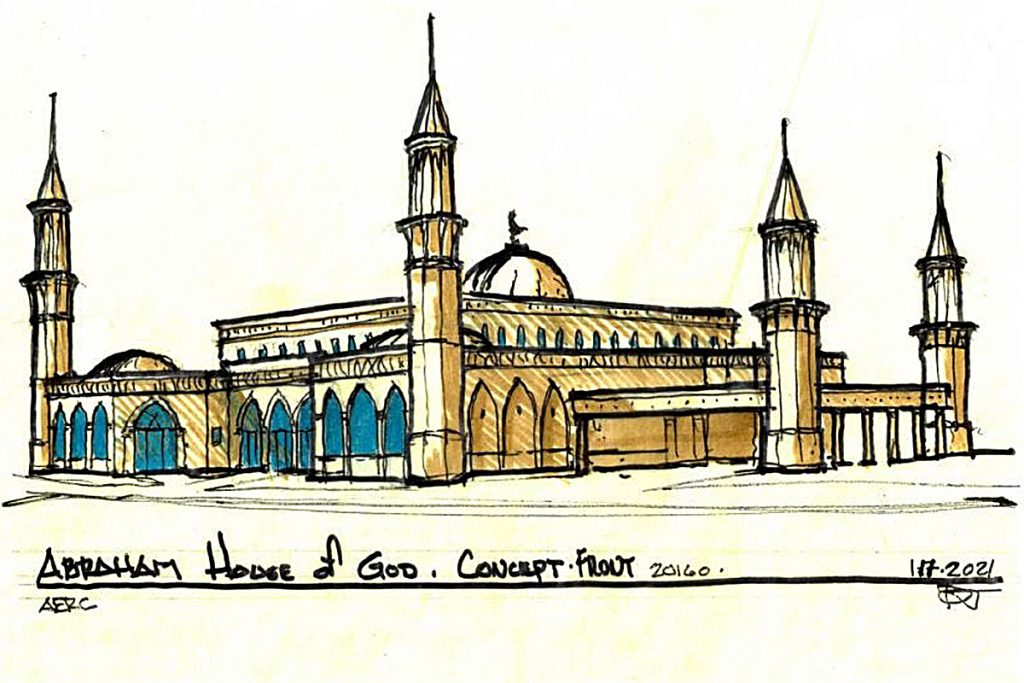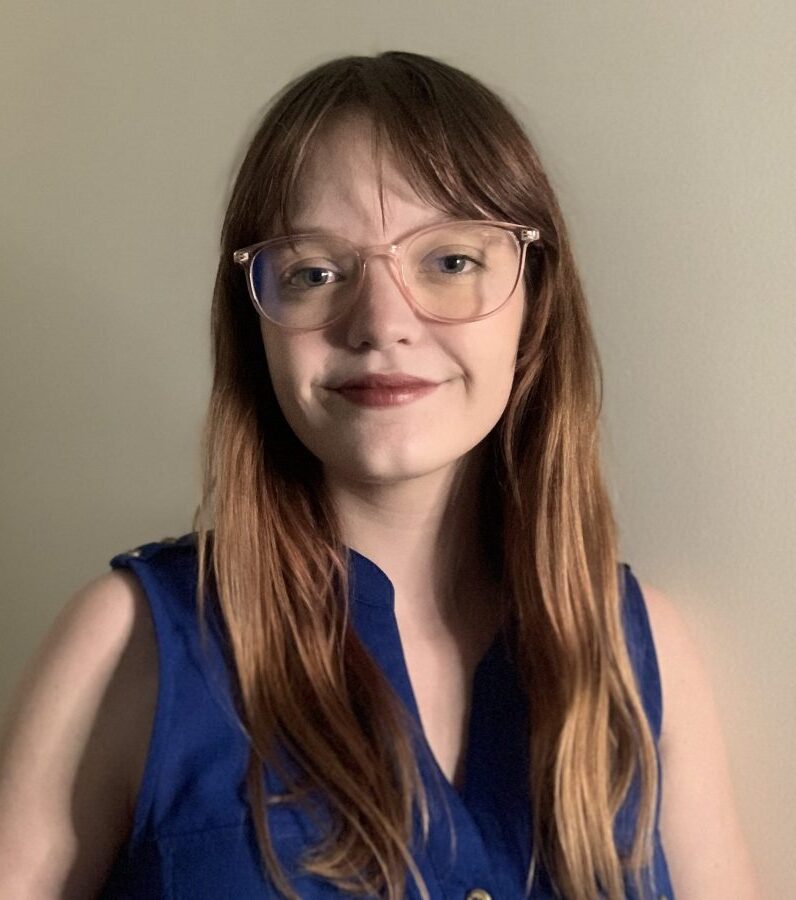It was around 1 a.m. when Ray Elk and his family returned home from Ramadan celebrations on May 5. The children had school in the morning, but there was no way around the late night—not with a 40-minute-long drive home to their home in DeSoto County from the sunset-centered ceremony.
Elk spent upwards of two years working to make sure that one day his family—alongside the 15 other Muslim families in the area—could attend worship without setting aside such a huge portion of their day and using so much gas for the trip. After all, he thought, the city already has a dozen or so churches, so what difference would one mosque make to anyone else?
So he set about creating plans for the mosque—the Abraham House of God—to be built on Church Road in Horn Lake.
Shortly after Elk purchased the land for his dream mosque, one of the adjacent property owners approached him to offer to buy the land from him. Elk turned the offer down.
“He had a friend with him, and he told me, ‘Over our dead bodies will you build a mosque in Horn Lake,” Elk told the Mississippi Free Press.
About two years have gone into the planning of the mosque, so far.
In 2019 Elk approached the mayor about wanting to build a mosque and secured time to speak with the Board of Aldermen in December of that year. Elk says, at the time, the board seemed to approve of his proposal.
After purchasing the land for the mosque, establishing it as a nonprofit and working with an architect to design the building, Elk and his lawyer finally presented their proposals.
Roadblocks, From Phantom Loudspeakers to Traffic
The Horn Lake Office of Planning and Development board officially heard Elk’s proposal to build the mosque at a meeting on Feb. 22 of this year. The board allowed public commentary before voting.
Greg Speltz, a neighbor of the mosque property, was the first community member to speak following the presentation. “There’s no way the Church Road can handle a new development…,” Speltz said, explaining that the road has not seen many improvements in his 45-year-tenure as a resident there.
Later, Speltz advocated for the construction of a residential community in the area, rather than a mosque, saying that “the surrounding area (would) definitely benefit from a development such as Turkey Creek.”
Speltz did not explain how his concerns about traffic on Church Road would apply to the mosque but not to a residential community.
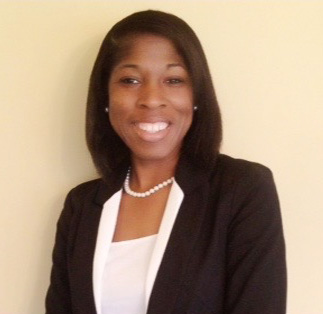
Several other community members spoke, with many expressing concerns about the mosque using loud speakers—despite the presentation showing that no loud speakers would be installed nor calls to prayer issued over them. Architect Douglas Thornton repeatedly reminded the commenters that the mosque would not use speakers.
After other community members spoke—mostly repeating concerns about traffic and noise—the planning board voted unanimously to deny Elk’s application for permits to build the mosque.
Elk and his lawyer Barry Bridgforth Jr. appealed the decision.
“They see TV and the call for prayers, and they assume that that’s how it’s done everywhere—But this is done in Muslim countries because the whole neighborhood is Muslim,” Elk said. ”In the United States I have never seen that, and I have never heard of any.”
‘If You Let Them Build It, They Will Come’
Horn Lake’s April 20, 2021, Board of Aldermen meeting began with a Christian prayer, read aloud, like most of their meetings do.
Seventeen minutes into the meeting, the Abraham House of God mosque appeal was brought to the floor. Bob Barber, a city planning consultant from Orion Consulting, introduced the issue, before attorney Bridgforth took his spot at the podium, addressing the board.
“The preliminary site plan according to the staff report, and (former Planning Director Ethan Greene), meets all of your requirements for site plan approval,” Bridgforth said during his introduction.
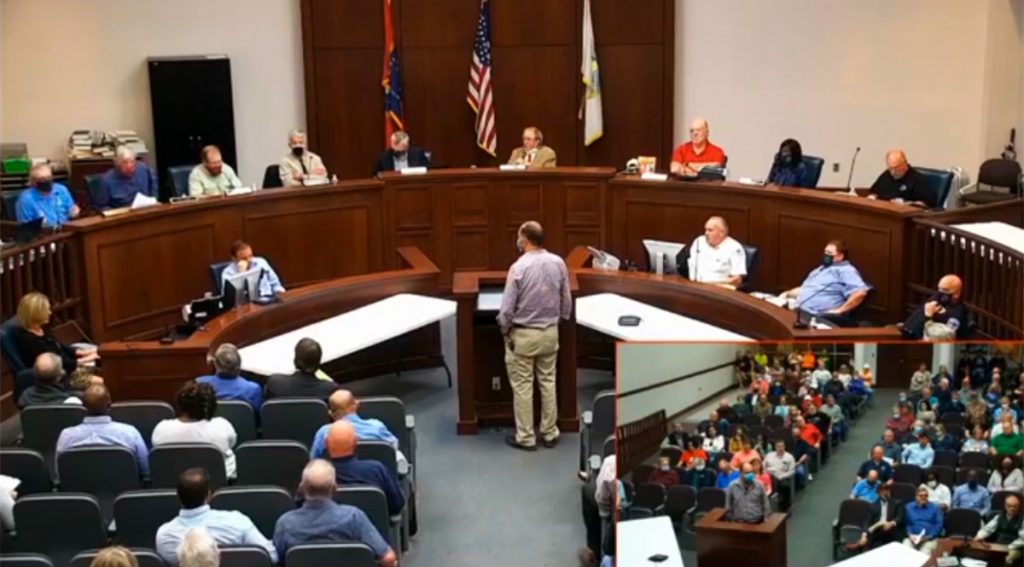
Bridgforth explained that plans for the mosque had been augmented to cater to concerns mentioned at the previous meeting.
“We’re here with a permitted use, and a site-plan approval that meets all of your requirements as a city per your zoning ordinance, according to your city planner,” Bridgforth said.”So basically, what we’re here before is not a discretionary function for you all—it’s a ministerial act.”
Soon, mosque architect Thornton took the podium. One board member refused to acknowledge Thornton’s expertise on the subject. “The noise ordinance prevents that building from being there,” alderman John E. Jones Jr. said.
“It would not generate any noise and—.” Thornton was interrupted.
“Yes, it would,” Jones said. “Don’t. You’re, you’re not the person who’s building the building. The people that there’s going to build the building and be in the building are the people that should be here rather than y’all because y’all can speak for those people what they can do.”
Despite the augmentations, the board denied Elk’s mosque again, with only one vote in its favor and one absent member; he would have to appeal it again.
“Nobody in the area wants to have the problems that could arise,” Jones said at the April 20 meeting, first reported by the Commercial Appeal. “We’ve got a school right down the road. They say they’re not going to do this, but they have lawsuits all over the country that are unsettled because of the noise. If you let them build it, they will come. I think we need to stop it before it gets here.”
Jones did not return phone and email messages.
Another Mosque and A Changed Mind
Horn Lake, which has 27,000 residents in DeSoto County close to Memphis, has no mosques, synagogues or Buddhist temples, while the City’s website displays a map to 13 Christian churches under a “Places of Worship” tab.
Alderman Charlie Roberts visited a mosque for the first time, in Memphis, after voting to deny the permit for the Abraham House of God mosque to be built in Horn Lake.
After his visit to the mosque, Roberts called Elk to tell him he had a change of heart.
“He called me, and he apologized,” Elk told the Mississippi Free Press. “… He said ‘it was like a church,’ and it seemed like he didn’t have knowledge of other religions (before then).”
At the next Board of Aldermen meeting, on May 4, Roberts proclaimed his new perspective publicly.
“If we can have Baptist churches, Methodist churches, Pentecostal churches on every corner and have the freedom to religion, we also should be able to allow our our Islamic Muslim friends to have the same worship,” Roberts said at the May 4 Horn Lake Board of Aldermen meeting. “I support the freedom of religion, and I will stand behind the freedom of religion for everybody.”
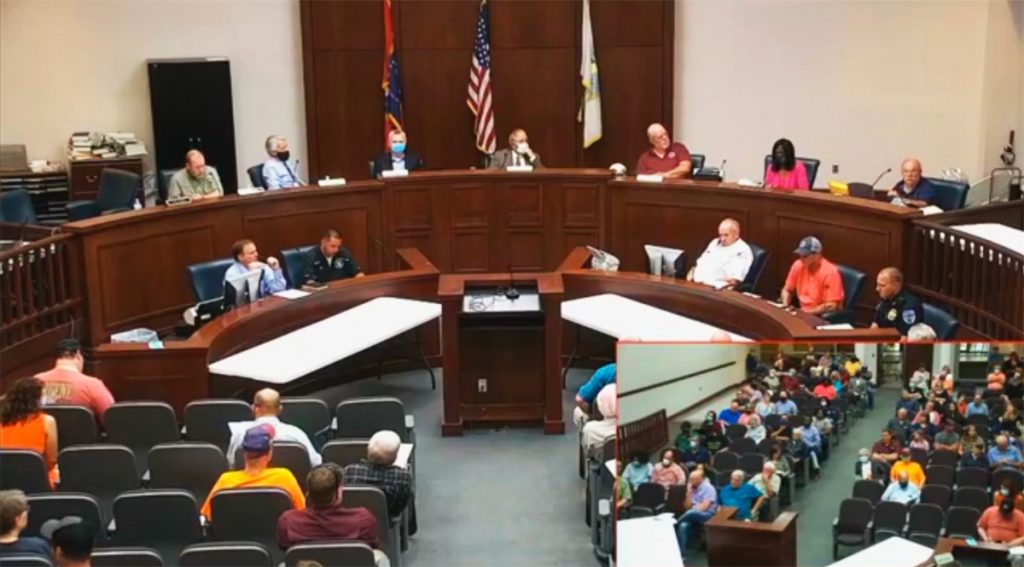
Roberts credited his new newfound passion for supporting both the mosque—after first calling it a “Muslim church”—in a later conversation with the Mississippi Free Press, saying he was influenced by a Christian preacher who told him God wants people to build bridges.
The white 28-year automobile salesman referred to hearing another alderman saying publicly that “We don’t want those people here,” adding, “We stepped over the line of violating not only discriminatory rights because they’re Muslims, and also their freedom of religion. It’s like a double whammy. I tried everything on my behalf to do the right thing and show my colleagues this is not the right thing.”
He believes the freedom of religion violation will end up in federal court. “It’s coming about because my colleagues are not willing to speak up and make a change,” he said, also sharing that he recently lost his re-election bid after serving 12 years and three terms as a Horn Lake alderman.
“I feel like the only way to not be in violation is to make a change,” Roberts said.
Freedom of Religion
When Charlie Roberts proclaimed his change of heart on the mosque on May 4, he began his comments by saying that the United States was founded on the ideals of free speech, the right to bear arms and the freedom of religion.
The first two amendments of the U.S. Constitution backs up Roberts’ words, and federal laws officially protect them as well. Discrimination based on religion is considered a “protected class,” according to Steven Mulroy, a Bresden professor of law at the University of Memphis’s Cecil C. Humphreys School of Law. Elk’s lawyers would need to have a preliminary showing that the denial of the permit was discriminatory, he said, after which point it would be the burden of Horn Lake to defend the denial of the permit.
The Religious Land Use and Institutionalized Persons Act, also known as RLUIPA, applies to the mosque’s case at the federal level as well. To win against Elk’s appeal, if it is filed under RLUIPA, the City of Horn Lake would have to prove under strict scrutiny that they had no other choice but to completely deny the mosque building permits in order to serve the public interest, according to Mulroy.
“One of the problems of (their) argument, as I understand it, in the Horn Lake case, is that the area is already zoned for apartment construction, and they wouldn’t have a problem if the owner just wanted to build apartments,” Mulroy said.
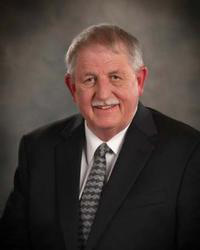
Mulroy, citing the 1977 Supreme Court case Village of Arlington Heights v. Metropolitan Housing, explained that discriminatory comments from not only the board members but also from public comments could be used as evidence in favor of Elk proving discrimination.
“It’s more provative to have arguably discriminatory comments coming out of the mouths of the actual decision makers, in this case, the aldermen,” Mulroy said. “However, there is precedent in these cases. … If you can show that the decision was made in an environment where there was a lot of public outcry that was itself discriminatory putting pressure on the elected officials, then that’s relevant evidence. Again, not dispositive, but relevant evidence to suggest that elected decision makers might have also been discriminatory.”
Alderman At-large Donne “Chigger” White declined to comment because he only has one meeting left in office before he retires from the position, White told the Mississippi Free Press.
Alderman Tommy Bledsoe returned a call from the Mississippi Free Press but declined to comment, saying that speaking to the press was the mayor’s job. The Mississippi Free Press has been unable to reach Aldermen Michael Guice, Jackie C. Bostick and LaShonda Johnson. Mayor Allen Latimer declined to answer any questions, saying the city attorney advised him not to speak on the issue.


